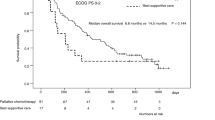Abstract
Background
Clinical efficacy of aggressive end-of-life (EOL) chemotherapy remains unclear.
Method
Medical records of patients with advanced cancer between August 2011 and August 2016 were retrospectively analyzed. The primary endpoint was to identify prognostic factors at the last administration of chemotherapy. The secondary endpoint was to analyze the relationship between EOL symptoms and EOL treatment details.
Results
Among 300 evaluated patients, the number of patients who died within 14 and 30 days from the last administration of chemotherapy were 16 (5.3%) and 50 (16.7%), respectively. Multivariate analysis revealed that ECOG-PS (OR 3.698, p < 0.001) and GPS2 (OR 3.791, p = 0.028) were significant prognostic factors. The MST of patients with both PS 2–4 and GPS2 (+) was 38 days, while that in patients with both PS 0–1 and GPS2 (−) was 134.5 days. The prevalence rate of nausea and vomiting (25.0%) and the mean hydration volume (0.50 L/day) in patients who died within 30 days from the chemotherapy was significantly higher than others (7.4%) (0.20 L/day).
Conclusion
ECOG-PS and GPS were significant prognostic factors for aggressive EOL chemotherapy. Information on these factors may aid clinical decision-making in terms of risk–benefit balance, particularly in patients with poor prognosis.


Similar content being viewed by others
References
Earle CC, Neville BA, Lndrum MB et al (2004) Trends in aggressiveness of cancer care near the end of life. J Clin Oncol 22:315–321
Nappa U, Lindqvist O, Rasmussen BA et al (2011) Palliative chemotherapy during the last month of life. Ann Oncol 22:2375–2380
Braga S, Rute Fonseca AM, Moreira A et al (2007) The aggressiveness of cancer care in the last three months of life: a retrospective single centre analysis. Pscho-Oncology 16:863–868
Barbera L (2006) Indicators of poor quality end-of-life cancer care in Ontario. J Palliat Care 22:12–17
Hanny A, Sonja H, Georg B (2014) Chemotherapy near the end of life: a retrospective single-centere analysis of patients’ charts. BMC Palliat Care 13:26
Kao S, Shafig J, Adams D (2009) Use of chemotherapy at end of life in oncology patients. Ann Oncol 20:1555–1559
Petra G, Aynharan S, Theresas T et al (2015) Variations in intensity of end-of-life cancer therapy by cancer type at a Canadian tertiary cancer centre between 2003 and 2010. Support Care Cancer 23(10):3059–67
Forrest LM, McMillan DC, McArdle CS et al (2003) Evaluation of cumulative prognostic scores based on the systemic inflammatory response in patients with inoperable non-small-cell lung cancer. Br J Cancer 89:1028–1030
Inoue SK, van Dyck CH, Alessi CA et al (1990) Clarifying confusion: the confusion assessment method. A new method for detection of delirium. Ann Intern Med 113:941–948
Morita T, Bito S, Kurihara Y et al (2005) Development of a clinical guideline for palliative sedation therapy using the Delphi method. J Palliat Med 8:716–729
Prigerson HG, Bao Y, Shah M et al (2015) Chemotherapy use, performance status, and quality of life at the end of life. JAMA Oncol 1(6):778–784
Nozoe T, Ninomiya M, Maeda T et al (2010) Prognostic nutritional index: a tool to predict the biological aggressivenesss of gastric carcinoma. Surg Today 40:440–443
Maeda K, Shibutani M, Otani H et al (2014) Low nutritional prognostic index correlates with poor survival in patients with stage IV colorectal cancer following palliative resection of the primary tumor. Eorld J Surg 38:1217–1222
Kanda M, Fujii T, Kodera Y et al (2011) Nutritional predictors of postoperative outcome in pancreatic cancer. Br J Surg 98:268–274
Masaichi O, Naoshi K, Go M et al (2015) Glasgow prognostic score as a prognostic clinical marker in T4 esophageal squamous cell carcinoma. Anticancer Res 35:4897–4902
Okuno T, Wakabayashi M, Kato K et al (2017) Esophageal stenosis and the Glasgow Prognostic Score as independent factors of poor prognosis for patients with locally advanced unresectable esophageal cancer treated with chemoradiotherapy (exploratory analysis of JCOG0303). Int J Clin Oncol 22(6):1042–1049
Hiramoto S, Kato K, Boku N (2018) A retrospective analysis of 5-fluorouracil plus cisplatin as first line chemotherapy in the recent treatment strategy for patients with metastatic or recurrent esophageal squamous cell carcinoma. Int J Clin Oncol 23(3):466–472
Inoue A, Kobayashi K, Usui K et al (2009) First-line gefitinib for patients with advanced non-small-cell lung cancer harboring epidermal growth factor receptor mutations without indication for chemotherapy. J Clin Oncol 27(9):1394–1400
Author information
Authors and Affiliations
Corresponding author
Ethics declarations
Conflict of interest
All the authors have approved the submission of this manuscript to your journal. There are no conflicts of interest to declare.
Electronic supplementary material
Below is the link to the electronic supplementary material.
About this article
Cite this article
Hiramoto, S., Tamaki, T., Nagashima, K. et al. Prognostic factors in patients who received end-of-life chemotherapy for advanced cancer. Int J Clin Oncol 24, 454–459 (2019). https://doi.org/10.1007/s10147-018-1363-7
Received:
Accepted:
Published:
Issue Date:
DOI: https://doi.org/10.1007/s10147-018-1363-7




